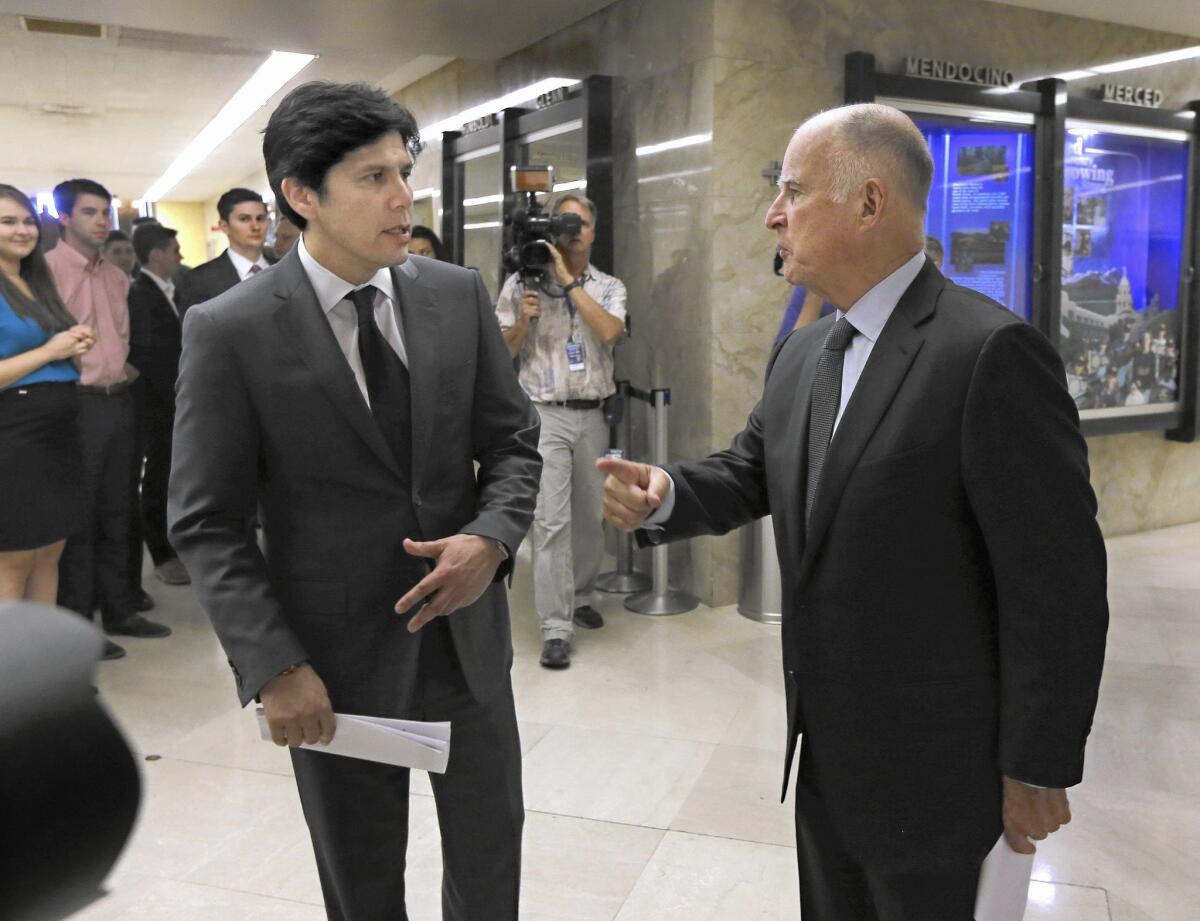With climate change and road repairs, Brown jumps into last-minute legislative fray

Reporting from Sacramento — Last month, Gov. Jerry Brown raised eyebrows by dodging questions about debates over legislation and joking that he stands “above the fray.”
On Thursday, it became clear that phase had ended, and he was diving into some big Capitol scuffles.
Brown worked with state Senate leader Kevin de León (D-Los Angeles) to secure important support from utilities for climate-change legislation that would increase the state’s use of renewable energy.
The governor also produced a new plan for funding road repairs, proposing a mix of higher gas taxes, a new fee on vehicles and money from the state’s pollution-reduction program.
Brown’s efforts come with just a week left in the legislative session, and there’s no guarantee he’ll be successful.
Oil companies are fiercely opposed to the climate-change measure, which would also require California to slash gasoline use on state roads. And Republicans, whose support is needed for any new revenue, said they won’t support the taxes and fees the governor wants for roads.
In addition, there’s been turmoil among Assembly Democrats, who decided Thursday that Anthony Rendon (D-Lakewood) would replace Toni Atkins (D-San Diego) as speaker next year.
The day began with Brown dispatching a top administration official, Transportation Secretary Brian Kelly, to present Republican leaders with a proposal for road maintenance. Problems with California’s highways, bridges and streets have been left unaddressed for years, leading to tens of billions of dollars in overdue costs.
Brown’s proposal for $3.6 billion in annual funding would draw most of the money from a $65 fee for vehicle owners, an 11-cent increase in the diesel tax and a six-cent hike to the gas tax.
An estimated $500 million would come from the state’s cap-and-trade program, which charges fees to polluters. The money is required to be spent on programs that reduce greenhouse gas emissions, and Republicans have argued that fixing roads would reduce travel times, leading to less pollution.
The proposal would split the funding between state and local governments, and $400 million of the local money would be directed toward public transit programs.
“The administration’s proposal was put forth after engaging with Democrats, Republicans and lots of people who are concerned about adequate funding for our crumbling roads and highways,” Gareth Lacy, a spokesman for Brown, said in a statement. “It includes sensible reforms and sufficient revenue to improve our roads, bridges, public transit and trade corridors — all vital to boosting quality-of-life and economic competitiveness.”
------------
FOR THE RECORD
Sept. 4, 6:42 a.m.: An earlier version of this article identified a spokesman for Gov. Jerry Brown as Gareth Lacey. His name is Gareth Lacy.
------------
Brown’s proposal was welcomed by local governments, transportation advocates and the California Chamber of Commerce. It included some Republican ideas, such as public-private partnerships to manage road projects and streamlining environmental reviews.
It’s unclear whether Brown can get the two-thirds majority in the Legislature that’s needed to raise taxes and fees.
“Unfortunately, the administration’s ideas call for more than doubling the vehicle registration fees and raising the price of fuel on all Californians,” said a statement from Assembly Republican leader Kristin Olsen of Modesto. “We disagree and think Californians have paid enough.”
Support for the climate-change measure from major utilities was a long-sought advance. The companies had been holding out for more flexibility in purchasing energy from sources such as solar and wind.
Although that amendment was made, the businesses were not able to persuade Brown and De León, author of the bill, to allow them to count rooftop solar panels in their service areas toward renewable energy requirements.
De León’s legislation, SB 350, has passed the Senate but still needs approval from the Assembly. If passed and signed by Brown, it would require the state to generate 50% of its electricity from renewable sources by 2030, an increase from the current target of 33% in 2020.
In a statement, Southern California Edison said “the updated bill is a positive step toward achieving the state’s clean energy and climate goals.”
A bigger challenge to the climate legislation still looms from oil companies, who are fiercely opposed because of the proposed requirement to reduce gasoline consumption. They’ve been pressing Assembly Democrats to block the measure.
Twitter: @chrismegerian and @melmason
ALSO IN THE NEWS
8 from L.A. arrested in nationwide counterfeit money scheme
Metrolink evaluating safety of state-of-the-art rail cars in wake of Oxnard crash
Jorge Ramos is on the defensive over his role as journalist and immigrant activist
More to Read
Sign up for Essential California
The most important California stories and recommendations in your inbox every morning.
You may occasionally receive promotional content from the Los Angeles Times.












